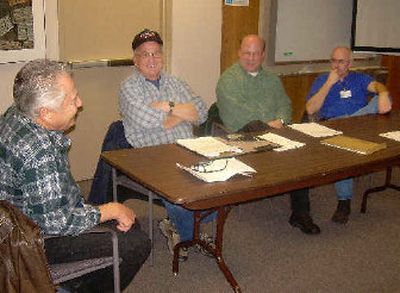Boiler panel fires itself up once a month

The meeting of the Boiler Advisory Board is a strictly no-frills operation.
In fact, city boiler inspector Ed Kimbrall has brought the same clump of rubber-banded pencils to the monthly meeting for the past seven years.
“Haven’t had to buy new ones yet,” he said.
Kimbrall and three volunteer board members administer the boiler operator-licensing test the second Tuesday of each month. That’s it.
No minutes to read, no fiscal reports, no Robert’s Rules of Orders. Just the test.
Board chair Terry Conwell and board member Lowell Peterson have been serving since 1993.
“We’re so devoted to this program and to the city of Spokane, we just keep coming,” Peterson joked.
Conwell is a retired boiler inspector from Hartford Steam Boiler insurance company. “Boiler owners need insurance because boilers can blow up,” he said.
Which could explain why most employers require boiler operators to have a license.
Dan Eagle, the third volunteer member, says boilers are in use throughout Spokane in laundries, dairies and schools. A boiler is the part of a steam generator in which water is converted into steam. It consists usually of metal shells and tubes.
The city has more than 900 licensed boiler operators. At the December meeting, three applicants showed up in the City Council briefing room to take the 50-question test.
One question read, “A scotch marine boiler is a …?” If you answered, a drink that caused you to forget your freshman year of college, you might have difficulty with the rest of the test.
Applicants are given all the time they need to complete the test and must have a grade of at least 70 percent to pass.
Applicant Wilbur Reed had been a boiler operator in the Navy for 21 years. He let his license lapse and showed up to renew it.
Thirty minutes later, he was done.
“You’d better study for it,” he said of the test. The board scored his test (he’d missed only five) and asked him a few impromptu questions.
While the members laughed with Reed and talked boilers, the other applicants, Curt Walters and C.R. Truitt, kept their pencils moving. At one point Truitt had to ask for an eraser.
Walters turned his test in next and paced while it was scored. He too passed.
Only Truitt was left. Looking far less jovial as the evening progressed, he brought his exam to the board an hour after he’d begun.
He was at a disadvantage because he’d never operated a boiler before.
“It was hard,” he said while he waited for his results.
In the end it was a clean sweep. Three out of three passed the test and will get their boiler operator licenses.
The volunteer board members are paid a $60 stipend per meeting. For Kimbrall, it’s all part of a day’s work.
The city’s lone boiler inspector tossed his pencil collection into his briefcase and said, “I have to inspect 11 boilers a day to keep up.”
FYI: A scotch marine boiler is a fire tube, not a drink.